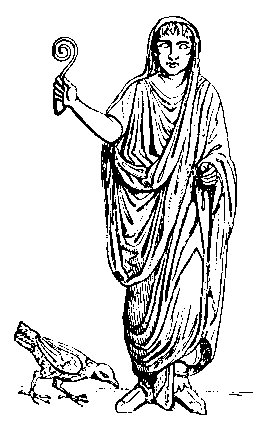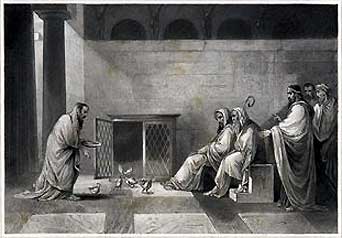Testing Astrologers
and
Roman Sacred Chickens
Shyamasundara Dasa
Copyright © 1993-2016
The following informal email was posted to my private jyotish forum in 1993.
The subject has been often brought up about testing astrologers. Therefore today I thought I would share with you some anecdotes from the past about how astrologers were tested then.
Arrian (2nd century AD), a Greek writer who was a Roman citizen holding several important military posts and governorships wrote two books that have come down to us: Alexander Anabasis and Indika. The first, literally "Alexander going down the country," is a chronicle of Alexander from the time of his assuming power in 336 BC to his death in 323 BC. The second is Arrian's description of India based on the accounts of those who accompanied Alexander, as well as other's such as Megastenes who was the ambassador of Seleukid Nikator to the court of Chandragupta I of the Gupta Dynasty (circa 300 BC). Here we are interested in what Megastenes had to say.
Apparently the sadhus and those who specialized in revealing the future would gather every year and make predictions for the forthcoming year. This, by the way is called Mundane Astrology, predicting about politics, economics, etc. of the country and the King. The rule was that if someone made predictions that did not come true three times he was not allowed to predict anymore!
The rule was that if someone made predictions that did not come true three times he was not allowed to predict anymore!
That is pretty severe but it would certainly make you keep on your toes. The next anecdote (according to Tacitus, Suetonius and Cassius Dio) is more draconian. Let us now shift to the island of Rhodes in the early 1st century AD.
Tiberius son-in-law of Augustus Ceasar is in self-exile on Rhodes on the plea that he wants to study philosophy. The real reason was that Augustus forced Tiberius to divorce his own wife Vipsania and marry Augustus's daughter Julia. Augustus, a doting father, was blind to the fact that his daughter was a complete debauch and brazen slut of the worst possible kind. And Tiberius was not about to tell Augustus. Tiberius did not want to be around while his wife, Julia, indulged herself. Later Augustus finally saw the light and had his daughter banished to the tiny island of Pandataria. When Tiberius eventually became Caesar he extracted his vengeance and starved her, she eventually died of malnutrition and despair.
While studying philosophy at Rhodes Tiberius would consult astrologers. Tiberius lived on a remote part of the island, he would have his freed slave (an x-gladiator) guide the astrologers to his abode via very steep slopes and along paths that clung to the sides of cliffs above the jagged rocks where the sea crashed. It was an arduous climb for the astrologers. When the astrologer finally arrived Tiberius would have him prepare his horoscope and predict for him. Then he would ask the astrologer to look into his own chart and predict for himself. Afterwards Tiberius would give the astrologer some money and send him off back the same way he came with Tiberius's freed man as a guide. But before going off Tiberius would give the guide a secret signal.
On the return journey when they got above the crashing waves and jagged rocks the freed man would hurl the false astrologer to his sure death.
Then the great astrologer Thrasyllus was brought to Tiberius in the same way. When Thrasyllus was asked to predict from his own horoscope he began to study it. He grew pale and exclaimed that his fate was very dark indeed and that he was in mortal danger. Tiberius liked this answer, he replied: "Grave danger yes, but you have been spared by the gods."
Tiberius could understand that this astrologer really knew astrology and could ascertain from his own chart that he was close to death. Unlike the pseudo-astrologers who could not even recognize the danger they were in and who were therefore ordered killed by Tiberius.
Subscribe to our mailing list. And get our intermittent newsletter and updates to this site.
[We should note that modern scholars doubt the veracity of this story. The hurling from hieghts etc. But then again modern scholars need to be different from pevious scholars in order to survive--publish or perish.]
Tiberius befriended Thrasyllus who taught Tiberius astrology and also predicted that Tiberius would become emperor which indeed soon happen. Augustus, on the death of his own sons and grandsons adopted Tiberius who became Tiberius Ceasar. Thrasyllus became a trusted advisor to Tiberius, and Thrasyllus's son Balbillus became the court astrologer of Claudius, Nero, and Vespasian in turn.
As we can see people took their astrology more seriously in the old days. (-: Hopefully the devotees wont be as severe.
Before leaving I wanted to share an amusing anecdote regarding how the Roman army went to war. Every Roman Consul was required to sacrifice and consult different auguries before going into battle. This was especially true during Republican Rome. The typical method of consulting was by feeding the sacred hens. If the chickens ate the grain offering then the Romans would confidently march into battle. If the hens refused to eat then the Romans would sit tight, retreat, or make peace as needed.

A Roman pullarius
An incident is recorded that during the First Punic War (between Rome and Carthage, 264-241 BC) a Roman consul Publius Claudius Pulcher ordered the pullarius (type of priest) to consult the sacred hens before the naval battle of Drepana (249 BC) to see if the Roman navy should engage the enemy. The pullarius came back saying that the hens would not eat. Enraged the consul ordered that the hens be thrown into the sea, shouting: Bibant, quoniam esse nolunt "They don't eat, so let them drink!" (Cicero, De Natura Deorum) The Romans went into battle and suffered a devastating defeat. The Senate had the Consul court marshalled and tried for incompetence and atheism because of ignoring the sacred hens and was fined, exiled and died soon afterwards, possibly by suicide as his political life was destroyed.

Roman Augurs foretell the future by
observing the behaviour of hens.
It may sound funny that the Romans determined their battle plans according to the eating of grains by the sacred hens. But this system of omens (divination) that they employed was immensely successful. Just consider that the Roman Empire started in 753 BC and lasted till 1453 AD with the fall of Constantinople and the end of the Byzantines. (The Empire had been divided into a Western and Eastern branch by Emperor Diocletian, the Byzantine Empire [after Byzantium, the former name of Constantinople] was the Eastern Branch) That is a total of 2207 years! The Roman Empire at its height spread from England, Portugal, and the Spanish Sahara in the West to the Crimea (Ukraine) and the Persian Gulf in the East, and from the North Sea and Denmark in the North to North Africa in the South. Not bad for chicken feed. (-: Even after the total fall of Rome there was the Holy Roman Empire that went on for hundreds of years. (One witty historian commented that it was neither Holy, Roman, nor an Empire.)
Your Servant
Shyamasunadara Dasa
See also: Livy, History of Rome who recounts an incident where a pullarius lied about the result of a consultation with the sacred hens and the resulting aftermath.

